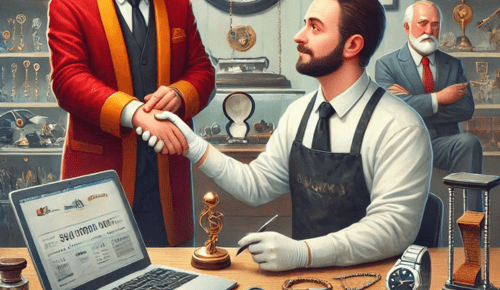
Pawn Shop Etiquette: A Guide for Owners and Customers
Introduction
Because they provide a special combination of retail and financial services, pawn shops are an essential element of the community. Knowing the proper protocol can make the transaction easier and more rewarding for everyone involved, whether you’re a customer trying to purchase or pawn things or the owner running a pawn shop.
What is a pawn shop like?
First, let’s clarify what a pawn shop is. A pawn shop is a business that offers secured loans to consumers who pledge their own personal property as collateral. The worth of the items that customers bring in, such as jewelry, electronics, or musical instruments, determines how much credit they are eligible for. The pawnbroker keeps the item until the loan is repaid in full, including interest. Alternatively, customers can sell products straight to the pawn company.
Dos & Don’ts for Customers:
Do Know the Value of Your Items: Before visiting a pawn shop, ascertain the exact value of the items you intend to sell or pawn. Make sure you receive a reasonable price by consulting experts or researching similar products online.
Items of sentimental worth that you would regret losing should not be pawned, even though pawn shops offer a quick and easy option to get cash. Choose things that you can afford to give up if need be.
Do Negotiate Responsibly: When visiting a pawn store, you may find yourself negotiating. Negotiations should, however, be approached civilly and sensibly. Remember that pawnbrokers must turn a profit while giving their clients fair prices.
Don’t Ignore the Loan Terms: Before finalizing the deal, thoroughly read over and understand the conditions of any pawn loan. Payback plans for loans, interest rates, and other related expenses should all be monitored. If you don’t abide by the terms, you could lose your collateral.
Do Retain Communication: If you are experiencing difficulties repaying your loan, get in contact with the pawn shop right away. A lot of pawnbrokers are willing to work with customers to create win-win agreements.
Dos and Don’ts for owners:
Do Provide Clear Information: At your pawn shop, make sure that the terms of the loans, interest rates, and item valuations are all prominently displayed. Transparent communication helps customers because it builds trust and empowers them to make informed decisions.
Don’t Press Customers: While aiming for loans and sales is natural, don’t push customers to do things they don’t want to. Respect their decisions and provide assistance without becoming overly involved.
Do Uphold Confidentiality: Respect your clients’ privacy by keeping the specifics of their transactions private. Unless mandated by law, keep information on loans and other matters confidential.
Regardless of their origin or look, treat every customer fairly and with respect. It is immoral and detrimental to your reputation to treat someone differently because of their gender, color, or financial situation.
Do Invest in Security Precautions: Among other security measures, install alarm systems, security cameras, and a secure storage facility to safeguard your pawn shop and its clients. A safe environment discourages crime in addition to fostering trust.
Conclusion
The capacity of communities to access financial and retail services is largely dependent on pawn shops. Adhering to appropriate etiquette benefits all parties involved, be it a consumer seeking a loan or the proprietor of a pawn shop. By adhering to the dos and don’ts outlined in this handbook, customers and owners can conduct pawn transactions with trust and integrity. Mutual trust and goodwill will result from this.
In conclusion, whether you’re running a pawn shop or pawning a family heirloom, adhering to proper etiquette ensures a polite and simple transaction process for all parties.
